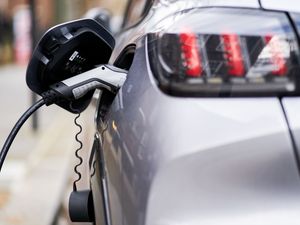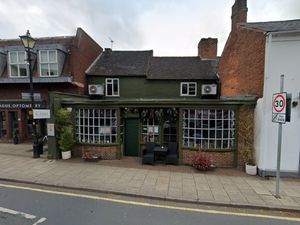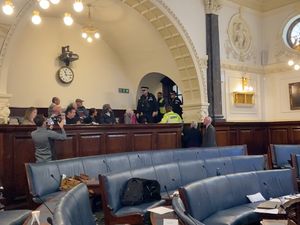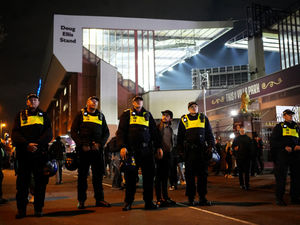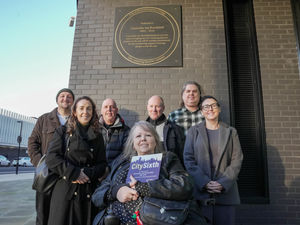Wolverhampton train passengers protest against hike in rail fares
Fed up train passengers have been protesting outside Wolverhampton railway station against a hike in ticket costs.
MP Rob Marris was part of a small group of campaigners handing out leaflets on Railway Drive after an average national price increase of 2.3 per cent came into force on Monday.
Trade-union backed campaigners Action For Rail organised demonstrations at more than 100 stations across the country on Tuesday, including in Birmingham, Manchester and Glasgow.
In Wolverhampton, the city's south west MP Mr Marris was joined by around six trade union and Labour Party members.
According to new figures, fares have risen three times faster than wages since 2010.
This year's rise in fares is the highest since January 2014, when they increased by 2.8 per cent.
Bank Holiday travellers at Wolverhampton railway station yesterday told how much their journeys have gone up by.
Ian Rees, aged 36, lives in Bilston and is a biomedical scientist who works in Worcester.
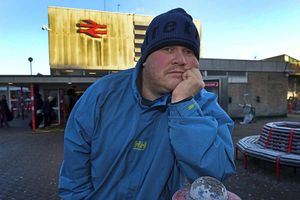
He said: "I've just bought my monthly season ticket and it costs me £155 for that. Then it costs me £38 for the plus bus to get me from the station to work.
"It's a big chunk of your monthly income to be honest. It doesn't surprise me how much it's gone up because every time I buy one of these tickets they increase."
Since 2010 West Midlands commuters have seen the price of their season tickets go up by an average of 29 per cent.
Figures vary between operators, with fares on Virgin Trains East Coast services up by 4.9 per cent this year.
The Government uses the previous July's retail prices index (RPI) measure of inflation to determine increases in regulated fares, which was 1.9 per cent.
These are around 40 per cent of all tickets and include season tickets on most commuter routes and some off-peak return tickets on long-distance journeys.
Kate Forrester, aged 29, is a press officer from Liverpool who works in London. She was in Wolverhampton to visit some friends.

She said: "If I don't book in advance, a return ticket can easily cost around £80.
"I've looked at alternatives like the coach but for the amount of time it takes, it doesn't really make sense for me."
Across the country the average commuter is now paying £2,788 for their season ticket, £594 more than in 2010.

Aaron Boyle, aged 25, from Eastfields in Wolverhampton, works in the mortgage sector.
He was travelling with his wife, Santa Boyle, aged 26, and two children, Sophia aged four and Emmet aged eight months.
He said: "We've just paid £70 for a trip to Church Stretton today. I think the increase is okay if you know you can get a seat and will have a comfortable journey, but I think they need to put on more carriages."
Mrs Boyle said: "Often, if you're travelling with the children it can be difficult to get a seat altogether if you can't reserve them beforehand. I think we pay enough already to travel."
Samantha Simcox, aged 48, and Mark Simcox, aged 49, are from Wednesbury.
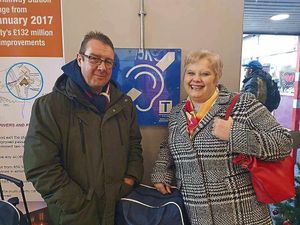
Samantha said: "We don't have an option but to travel by train as neither of us drives. We book trips around 12 weeks in advance otherwise it's extortionate. The most we've paid is £100 each for a trip to Torquay."
Jayne Lewis, aged 35, works in financial services in Birmingham.

She said: "I travel to Birmingham every day. I pay around £75 to £80 a month for my season ticket. I don't think that's too bad."
Train operating companies set the prices of other tickets but are bound by competition rules.
Bruce Williamson, of independent campaign group Railfuture, called on the Government to use the Consumer Prices Index (CPI) for regulated fare rises rather than RPI, claiming it is a "much more accurate figure" for measuring inflation.
He said: "This is only 0.6 per cent, which would be a much more reasonable fare increase."
According to the Rail Delivery Group (RDG), which represents train operators, around 97p in every pound paid by passengers goes back into running and improving services.
RDG chief executive Paul Plummer said: "Nobody wants to pay more to travel to work and at the moment in some places people aren't getting the service they are paying for.
"However, increases to season tickets are set by government. Money from fares is helping to sustain investment in the longer, newer trains and more punctual journeys that passengers want."
Transport Secretary Chris Grayling said: "We are delivering the biggest rail modernisation programme for more than a century, providing more seats and services.
"We have always fairly balanced the cost of this investment between the taxpayer and the passenger."

